Follow Your Different
252 Drunk: How We Sipped, Danced, and Stumbled Our Way to Civilization with Professor Edward Slingerland, Distinguished Scholar and Professor of Philosophy UBC
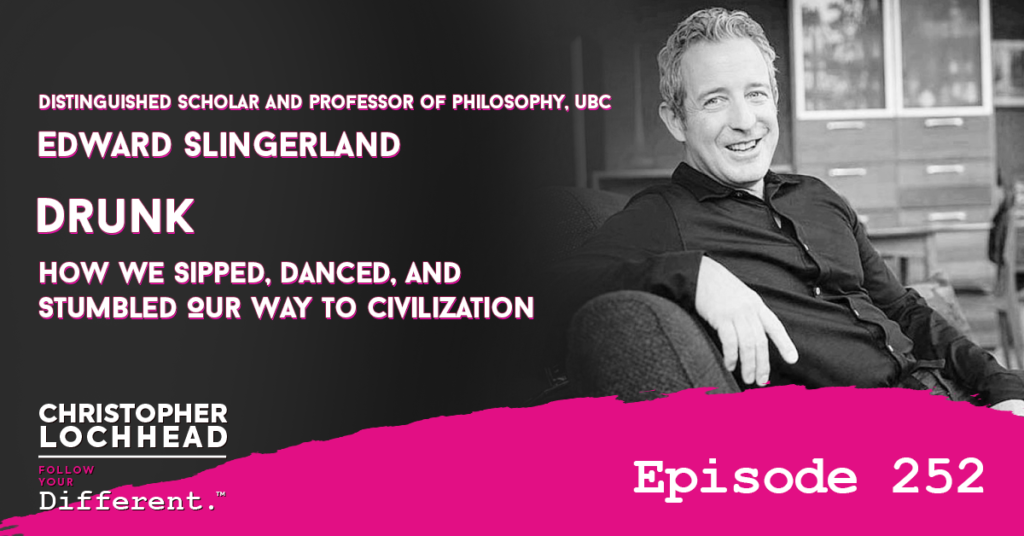
Podcast: Play in new window | Download (Duration: 1:21:34 — 56.0MB) | Embed
Subscribe: Apple Podcasts | Spotify | Pandora | RSS | More
Almost everything academic ever written about drinking and alcohol is centered on why it is bad for us. In this episode of Follow Your Different, we have the audacity to ask, “How does drinking and getting drunk make a difference to humanity?” And to answer that question, we have Edward Slingerland with us.
A bit of a disclaimer before we proceed: it is clear that for some people, drinking is a horrible thing. If you’re somebody for whom drinking represents a problem, then please know you have our thoughts and empathy. However, this episode is one that is going to celebrate the difference that drinking has made to society. Our guest today delves into that and more on his new book that studied how drinking is great for us as a society.
Professor Edward Slingerland is a distinguished university scholar and professor of Philosophy at the University of British Columbia, Canada. His new book is called Drunk: How we sipped, danced, and stumbled our way into civilization. We dive deep into that and more on this episode, so stay tuned.
Edward Slingerland on Getting Drunk
Prof. Edward shared that he had fun writing his book, Drunk. On one hand, it’s a topic people are interested in a lot, because it’s about drinking. For Edward, it’s also a mystery worth exploring, despite most people not even realizing it.
Finding books about different drinks and how to get drunk around the world is easy. Finding one about why people like getting drunk, is not.
“I don’t think anyone’s ever explored just the underlying question of why we like to get drunk in the first place. And so, it’s fun to actually problematize something that people take for granted.” – Edward Slingerland
Evolutionary Hijacks
So, why do we get drunk? The easiest answer is that it makes us feel good. But that’s not really an answer, according to Prof. Edward. That answer just opens up another one, which is “why does evolution allow us to get drunk?” In simpler terms, “Why?” This is the central mystery that Prof. Edward wants to explore.
The standard story we’ve been told in psych textbooks is that it was an evolutionary mistake. We somehow discovered something that just happened to randomly hijack reward circuits in our brain. So as clever primates, we figured that we could just take a shortcut and feel good without doing anything.
Prof Edward likens it to masturbation, which is another evolutionary hijack. Orgasms given us pleasure, and pleasure is the best carrot that evolution has to encourage us to pass on our genes to the next generation. Yet we have managed to hijack that with all sorts of non-reproductive sexual hijacks.
“But evolution lets us get away with that because it’s not interested in a perfect system. It’s happy with good enough. And this system is good enough.” – Edward Slingerland
Although unlike masturbation that old people say will make you blind, excessive alcohol consumption will literally blind you.
Reasons to Get Drunk
Despite all that, people have been gathering around the fire and drinking to their hearts content since the start of civilization. This just makes everything all the more mysterious, according to Prof. Edward.
Another thing that Prof. Edward noticed is that the evolutionary mistake story might not have been accurate. For one thing, most of our ancestors that domesticize plants didn’t do it for food. They were hunter-gatherers; they could just simply pick food up in the wilderness. Yet they still tried to grow such plants near their living spaces for easy access.
It was the same for the civilizations that discovered the ancestor of maize. It was a terrible grain to use as a food source, yet people chose to settle and raise this crop. All for the sake of getting drunk. So it was by no means an accident.
“There’s one estimate from ancient Sumer, is that half of the grain production went to making beer. So you’re taking in a place where people are on the edge of starvation, even in large scale civilizations, you’re taking half of your food stuff, and turning it into a chemical neurotoxin, something that’s going to harm your liver, increased cancer risk, lead to, potentially to social chaos, people drink too much of it. The costs that it imposes on humans means that it can’t be a mistake, there have to be countervailing benefits that that pay for the costs. So that’s what most of the book is trying to focus on what those what those benefits might be.” – Edward Slingerland
To hear more from Professor Edward Slingerland and why people love to get drunk, download and listen to this episode.
Bio
Edward Slingerland is Distinguished University Scholar and Professor of Philosophy at the University of British Columbia, where he also holds appointments in the Departments of Psychology and Asian Studies.
Educated at Princeton, Stanford and UC Berkeley, he has taught at the University of Colorado, Boulder, the University of Southern California and the University of British Columbia.
Dr. Slingerland is an expert on early Chinese thought, comparative religion and cognitive science of religion, big data approaches to cultural analysis, cognitive linguistics, digital humanities and humanities-science integration.
He is the author of several academic monographs and edited volumes from Oxford and Cambridge University Press, a major translation of the Analects of Confucius, and approximately fifty book chapters, reviews, and articles in top academic journals in a wide range of fields, from psychology, cognitive science and linguistics to Asian studies, philosophy, religious studies and international relations.
He is the recipient of several book, research innovation and teaching awards.
Dr. Slingerland’s broad research goals involve exploring the potential of novel digital humanities techniques, introducing more psychological realism and evolutionary perspectives to cultural studies and philosophy, and getting scientists to understand the importance and value of humanistic expertise—especially when it comes to research areas such as literature, ethics or religion.
His first trade book, Trying Not to Try: Ancient China, Modern Science and the Power of Spontaneity (Crown 2014), ties together insights from early Chinese thought and modern psychological research.
His second, Drunk: How We Sipped, Danced and Stumbled Our Way to Civilization (Little, Brown Spark June 2021), targets the standard scientific view of our taste for intoxicants as an evolutionary accident, arguing instead that alcohol and other drugs have played a crucial role in helping humans to be more creative, trusting and prosocial, thereby easing the transition from small-scale to large-scale societies.
Dr. Slingerland is also Director of the Database of Religious History (DRH), an online, quantitative and qualitative encyclopedia of religious cultural history, based at UBC and involving a large international network of postdocs, editors and contributors.
As primary investigator, he has received over $11 million in grants to support projects exploring the origins of religion and their role in supporting large-scale societies or developing innovative digital humanities techniques and platforms.
Dr. Slingerland also teaches two popular MOOCs on the edX platform on “Chinese Thought: Ancient Wisdom Meets Modern Science” and “The Science of Religion.”
Slingerland is a US-Canadian dual citizen. He was born in New Jersey and spent fifteen years in California (San Francisco and Los Angeles) before moving to Vancouver, BC, to take up his position at UBC.
An avid ocean kayaker, gardener, cook and appreciator of wine, he splits his time between Vancouver, Canada and Northern California.
Links
Website:
Twitter: @Slingerland20
Check out his book: Drunk: How we sipped, danced, and stumbled our way into civilization
More about Professor Edward Slingerland:
WSJ: Drunk review: Two cheers for happy hour
NYTimes: A History of Getting Hammered, and Why Some of Us Should Keep Doing It
We hope you enjoyed this episode of Follow Your Different™! Christopher loves hearing from his listeners. Feel free to email him, connect on Facebook, Twitter, Instagram, and subscribe on iTunes!
251 Unlocking Native Digitals with Hannah Grady Williams, author of Unlocking Gen Z
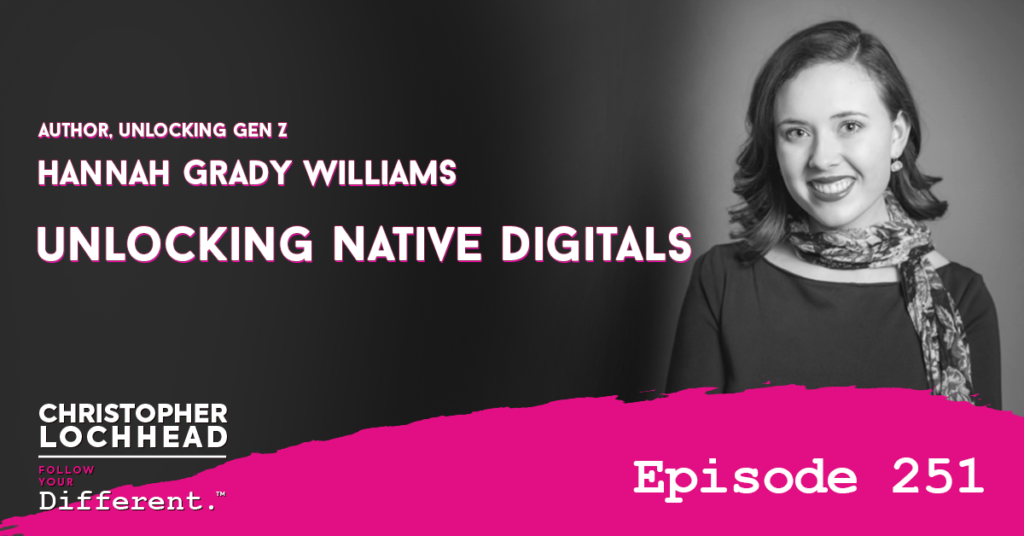
Podcast: Play in new window | Download (Duration: 1:32:47 — 63.7MB) | Embed
Subscribe: Apple Podcasts | Spotify | Pandora | RSS | More
Welcome to part two of our Native Digitals series here at Follow Your Different. On this episode, we have a conversation with Hannah Grady Williams on how your business can tap into the Native Digitals workforce. For those who are not familiar of what Native Digitals are, give part one of this series a quick listen (FYD 250).
Hannah Grady Williams is the Gen Z CEO Advisor, sort of like a Gen Z whisperer for CEOs and executive. She is the author of a new book called A Leader’s Guide to Unlocking Gen Z: Inside strategies to empower your team.
If you are over the age of 35, which is a Native Analog, this is a must-listen podcast. Because Hannah has a tremendous amount of insight for how Native Analogs can bridge the gap to work, recruit, and build our companies with a whole new slew of Native Digitals workforce.
Generation Differences: Gen X vs Gen Z, Native Digital vs Native Analog
When asked if the generation differences also coincide with the category of Native Analogs and Native Digitals, Hannah says that there are overlaps, but they are not completely the same. These overlaps are more on how each generation treats technology.
“Well, Gen Z, you think about all the kids sitting around the table constantly on their phones, not paying attention to anything. To you, you think it’s a distraction or something that’s taking my mind and my presence away from the people around me. The way I see it is a door that opens me to experiences I never could have had in my natural environment. As I’ve grown older, I’ve realized that distinction of the way that my generation looks at the world.” – Hannah Grady Williams
How Native Digitals Use Technology, and Why Analogs Don’t Get It
Hannah then talks about the time his brother mentioned what he has learned from Tik Tok. If you are a casual user, you might think that the platform is just all dance and viral memes. Yet there are people who use the platform to share important life lessons and tips they have learned themselves, in digestible, bite-size content.
Sadly, most parents’ reaction to someone just spending their time on social media is to just strip their phones or tablets from them. Rather than engaging with them and understanding, they just stop the activity. Because again, to them that is all just distraction.
“What they don’t realize, you know, if I’m looking from a Gen Xers perspective, or a Boomer’s perspective, I think of technology maybe the same way as any other technological innovation that might distract you from family time at the dinner table. But the way my generation sees it is, not only are we getting access to an entirely new world of people. It’s actually a portal to a new world. it’s a portal, it’s a new way of thinking.” – Hannah Grady Williams
Millennials and Gen Z are the New Category of Humans
Hannah states that Native Digitals is a great way of describing the New Age of Humans that we have now. She also thinks that it will become more pronounced once the next generation Gen Alpha, comes around.
Hannah then brings up a book called Ready Player One. It is about living immersed in a digital world and treating the real world as the alternative. While the real-world economy is at a downfall, it didn’t really matter to its citizens. As their life is spent in their digital selves, they saw no need to be lavish in real life.
While it is an exaggerated version, it does mirror how Native Digitals prioritize their digital lives over their physical ones. You see people buying expensive digital products while in real life, they barely buy new clothes and the like.
That’s what Native Analogs should take note this early. Otherwise, they might be left hanging once almost everything goes fully digital.
To hear more from Hannah Grady Williams and how your business can reel in the Gen Z and Native Digitals of the world, download and listen to this episode.
Bio
Hannah Williams’s story began in a blue pickup truck when her father handed 12-year-old Hannah the phone and asked her to close a deal on an investment property. After this unexpected introduction to the world of entrepreneurship.
She found herself thrust into a climate of innovation, challenge, and opportunity and she enrolled in college at age 14 and graduated with a degree in international business at age 18. Now, as a 23-year old Gen Z, she has consulted businesses from start-ups to Fortune 500 companies and is on a mission to help leaders leverage Gen Z talent as a competitive advantage and build #RadicalEmpathy in the workplace.
Links
Email: ha****@*************ms.com
LinkedIn: in/Hannah-Williams-Experience-Consultant
Read Hannah’s New Book!
A Leader’s Guide to Unlocking Gen Z
We hope you enjoyed this episode of Follow Your Different™! Christopher loves hearing from his listeners. Feel free to email him, connect on Facebook, Twitter, Instagram, and subscribe on iTunes!
250 New Category of Humans: Native Digitals Are Transforming The World & No One’s Paying Attention!
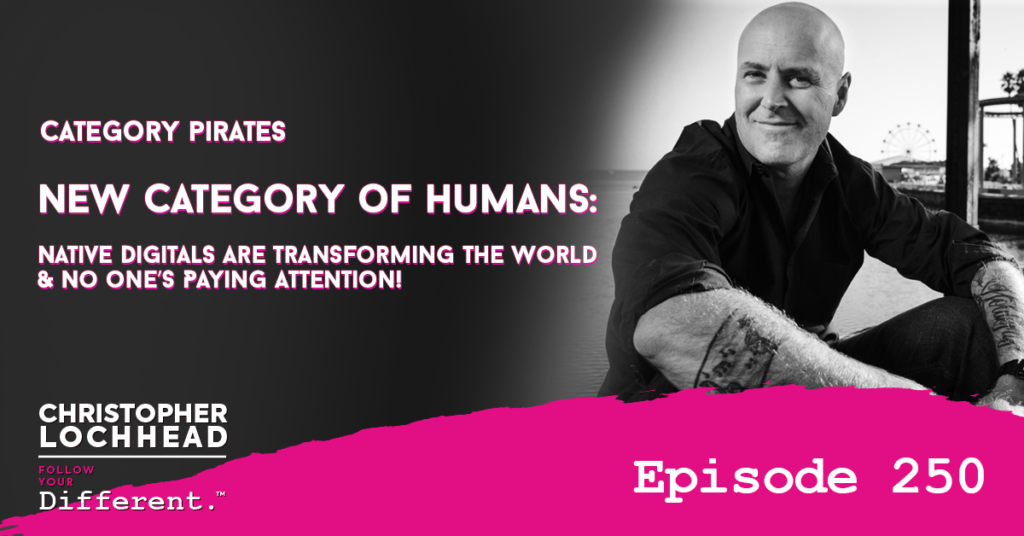
Podcast: Play in new window | Download (Duration: 45:27 — 31.2MB) | Embed
Subscribe: Apple Podcasts | Spotify | Pandora | RSS | More
Originally published in ?☠️ Category Pirates: It’s not a weekly newsletter. It’s a weekly mini-book.
Lately, there has been a fundamental, dare I say, seminal change in the category design of human beings. That is to say, the definition of what a human is has changed. You see, if you’re 35 and up, you are the last of a dying breed called Native Analogs. If you’re 35 or younger, you are the first generation of Native Digitals.
Native Digital’s experience life in a digital first way, and an analog way, second. Native Digitals have come of age integrated with the machines. Your smartphone and technology overall is like part of who you are as a person.
Most Native Analogs do not get this. Most people are not ready for the fact that everything is moving from an analog paradigm to a native digital world. So in this two-part series of Follow Your Different, we explore Native Digitals versus Native Analogs, and how it is important to realize that we are shifting to a digital paradigm faster than you think.
Category Neglect
First off, we start as to why it is important to recognize category shifts like the one we are experiencing now. Most category kings and queens tend to fall into a trap, in which they ignore new categories that may be adjacent or indirectly related to theirs.
When a new category arises (seemingly out of nowhere), the incumbent doesn’t topple over because they were unaware of the new category queen. More often than not, they fall because they dismissed what was happening right before their very eyes.
It’s not ignorance. It is arrogance coupled with the gravitational pull of “the way it is.” Because the people profiting in the present want things to stay the same.
This is called Category Neglect. Category Neglect doesn’t come from people being stupid or lacking sufficient data and resources to spot the headwinds and tailwinds of the future. It comes from a refusal to acknowledge which direction the wind is really blowing.
Why do they fall to such a seemingly obvious trap? This happens because the gravitational pull is too strong. A company gets used to earning hundreds of millions, or billions of dollars per year, and thinks it can do no wrong.
The company becomes deeply invested in the present. Anything that threatens the way it is now is dismissed.
Native Analogs vs Native Digitals
One of the most profound shifts happening in the world today is rooted in the ever-escalating debate between generations young and old. It is a shift hiding in plain sight. Just like the Tymshare executives staring out the window at Apple’s cranes building the headquarters of the company that would ultimately put them out of business, most people over 35 years old can’t see this shift happening.
Instead, they say to themselves, “Eh, we’ve got nothing to worry about.”
As Category Pirates, we feel it is our obligation to sound the alarm when we see rocky shores ahead. Some of us are facing a once-in-a-generation set of headwinds that could not just stymie growth, but sink our entire ship. If those of us over age 35 aren’t careful, this divide could result in one of the greatest instances of Category Neglect.
However, those who see this mega shift and act on it, on the other hand, will sail into the sunset a lot of happy pirates, make more money, and make a way bigger difference in the world.
With that said, let’s first give a better definition of what a Native Analog and Native Digital are. We’ll also define where their biggest difference lies.
There are two types of people on planet earth today.
- The first are Native Analogs. These are Baby Boomers and Gen Xers, born anywhere from the 1940s all the way up to the early ‘80s. Today, they range between the ages of 40 to 75, and make up approximately 136.8 million Americans.
- The second are Native Digitals. These are Millennials and Gen Zers, born between the early 1980s to as recently as the 2010s. These demographics are around 35 years of age on the high end, down to as young as 6 years old. They make up approximately 140.1 million Americans.
The difference?
Native analogs grew up in a time where technology was an addition or a distraction from their real lives.
Native digitals grew up in a time where their “real” lives were a distraction from their digital lives.
This is a profound shift—and no one seems to be talking about it. Even more stunning, some of the largest native digital brands on the planet are run by Native Analogs. Who don’t get it either.
To learn why it is important to know more about Native Digitals and how it can affect your category and businesses, download and listen to this episode. You can also check it out at Category Pirates.
Bio
Christopher Lochhead is a #1 Apple podcaster and #1 Amazon bestselling co-author of books: Niche Down and Play Bigger.
He has been an advisor to over 50 venture-backed startups; a former three-time Silicon Valley public company CMO and an entrepreneur.
Furthermore, he has been called “one of the best minds in marketing” by The Marketing Journal, a “Human Exclamation Point” by Fast Company, a “quasar” by NBA legend Bill Walton and “off-putting to some” by The Economist.
In addition, he served as a chief marketing officer of software juggernaut Mercury Interactive. Hewlett-Packard acquired the company in 2006, for $4.5 billion.
He also co-founded the marketing consulting firm LOCHHEAD; the founding CMO of Internet consulting firm Scient, and served as head of marketing at the CRM software firm Vantive.
We hope you enjoyed this episode of Follow Your Different™! Christopher loves hearing from his listeners. Feel free to email him, connect on Facebook, Twitter, Instagram, and subscribe on iTunes!
249 Decoding Greatness with Social Psychologist Ron Friedman, PhD
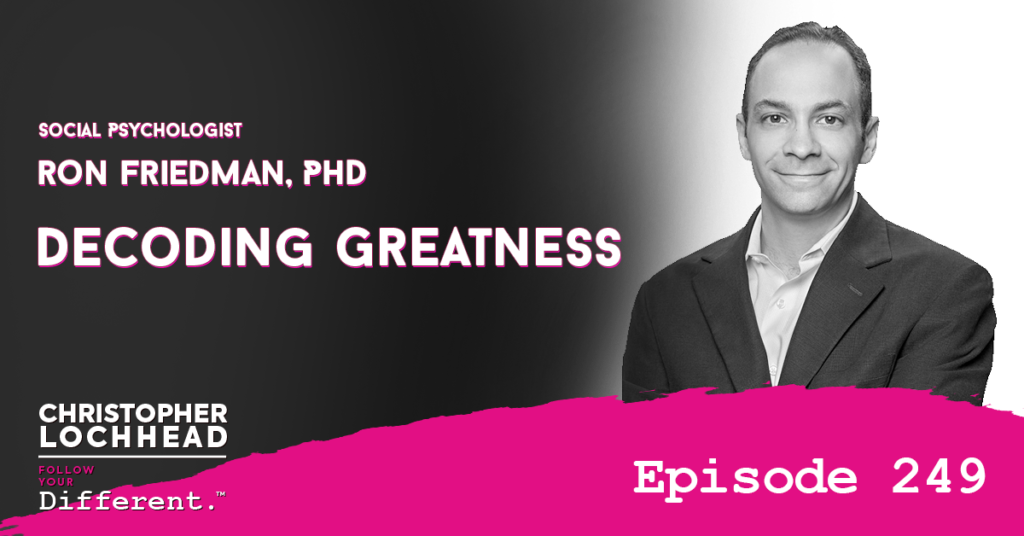
Podcast: Play in new window | Download (Duration: 1:11:07 — 48.8MB) | Embed
Subscribe: Apple Podcasts | Spotify | Pandora | RSS | More
Most people want to have a great life and do great work. But we are told that the way to achieve legendary results is either to have talent, or “practice” 10,000 hours a day. In this episode of Follow Your Different, Dr. Ron Friedman talks about a different, more proven way to achieve greatness that even mere mortals can embrace.
Dr. Ron Friedman is a PhD and award-winning Social Psychologist. He is the author of the no.1 bestseller called Decoding Greatness.
In this episode, we go deep on how you can decode greatness. We also discuss what legends before us have done using their approaches, models, and thinking to turbocharge our lives, our success, and our ability to make a difference.
Dr. Ron Friedman on Decoding Greatness
Dr. Friedman talks about his new book, Decoding Greatness and where he got the idea for it. His first book, The Best Place to Work, focused on giving people access to the best research on what it takes to perform at the highest levels and create a great workplace.
Though Dr. Friedman felt that there was something missing in his first book. He figured that even within a top-performing business or team, there’s still a range of performance levels. Some people are top performers, while some are still great but not at that level yet.
“In this book, Decoding Greatness, I was curious about what is it that top performers are doing differently. And what I discovered is that they’re using a method that most people don’t talk about. And yet it is far more common than we recognize.” – Dr. Ron Friedman
What We were Led to Believe
Dr. Friedman comments that there are two main stories that we are told about when it comes to achieving the highest levels. One of which is that it takes talent to do so, that you have to be born with certain strengths. You then have to match your talents to the appropriate fields that allow those strengths to shine.
Then there’s the big story about Practice. You know the one: 10,000 hours, practice, practice, practice. You have to exert yourself and have the right practice to be able to succeed.
Though according to Dr. Friedman, there is a third story that people don’t often talk about.
“There’s a third story and people don’t often talk about it. Yet it is remarkably common from entrepreneurs to inventors. to marketers. And that approach is reverse engineering, which simply means finding extraordinary examples in your field. By taking them apart, working backward, and figuring out how they were created, you can then apply those lessons to create something entirely new.” – Dr. Ron Friedman
Turning the Gap to a Learning Experience
There are those who say that those who perform at the top level are there because of their talents. Which can be insulting to all the work that person has also done to achieve his goals. Sometimes, people forget that even those who have certain advantages need to work their butts off to achieve greatness.
Dr. Friedman chooses to view it from another angle. He explains that if you apply Reverse Engineering on these extraordinary people and their achievements, you can turn it into a guideline for yourself.
“When you look at extraordinary performances through the lens of reverse engineering, you’ll have a different perspective. That different perspective is, “what can I learn from this? How can I improve my game through unpacking the methodologies and strategies that they are applying?”
So now that emotion, which would have been negative and uncomfortable and probably unhelpful in a way, I can turn that into a positive emotion and apply it to new learnings and insights, because now I have a mechanism by which to understand how he succeeded.” – Dr. Ron Friedman
To hear more from Dr. Ron Friedman and how to Decode Greatness and become a top performer, download and listen to this episode.
Bio
Ron Friedman, Ph.D., is an award-winning social psychologist who specializes in human motivation.
His new book, The Best Place to Work: The Art and Science of Creating an Extraordinary Workplace, has been described as “stunning,” “eye-opening,” and “a contemporary classic,” and praised by best-selling authors Daniel Pink, David Allen, Marshall Goldsmith, Susan Cain, and Adam Grant.
Dr. Friedman has served on the faculty of the University of Rochester, Nazareth College, and Hobart and William Smith Colleges, and has consulted for Fortune 500 companies, political leaders, and the world’s leading non-profits. Popular accounts of his research have appeared on NPR and in major newspapers, including The New York Times, Washington Post, Boston Globe, the Globe and Mail, The Guardian, as well as magazines such as Men’s Health, Shape, and Allure.
He is a frequent contributor to Harvard Business Review, CNN, Forbes, Fast Company, and Psychology Today.
Links
Connect with Dr. Ron Friedman today!
Websites:
LinkedIn: in/RonFriedmanPhD
Check out Dr. Ron Friedman’s bestselling works today!
We hope you enjoyed this episode of Follow Your Different™! Christopher loves hearing from his listeners. Feel free to email him, connect on Facebook, Twitter, Instagram, and subscribe on iTunes!
248 The Burnout Epidemic with #1 Bestselling Author Jennifer Moss
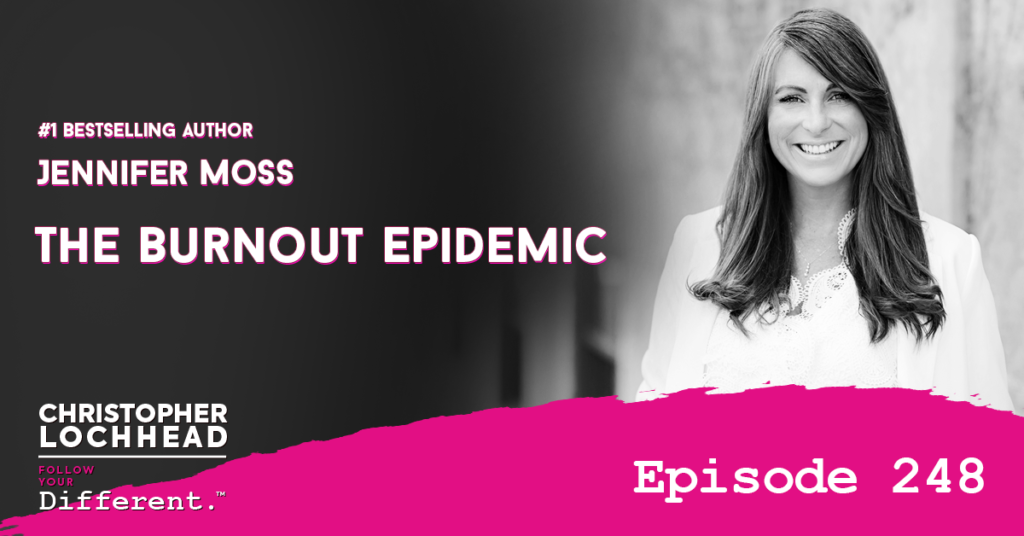
Podcast: Play in new window | Download (Duration: 1:22:35 — 56.7MB) | Embed
Subscribe: Apple Podcasts | Spotify | Pandora | RSS | More
Have you been feeling burned out over the last handful of months? Well, you are not alone. We live at a time that is extraordinarily challenging, yet exciting. This has caused many to freak out, or feel blown out or burned out. Our guest today, Jennifer Moss, calls what has been happening a “Macro Stress Event”. In this episode of Follow Your Different, we explore the Burnout Epidemic and more.
Jennifer Moss is the author of the brand-new number one bestseller Burnout Epidemic: The rise of Chronic Stress and how we can fix it. She has an extraordinary point of view on the matter, particularly on how to transform this stress experience into what she calls a post-traumatic growth.
We get into what are the real causes of burnout, and what organizations can do to prevent it. There’s also the idea of building an anti-burnout strategy based on prevention, and not offering them after the fact. We also discuss why traditional wellness initiatives seem to fall short these days.
Jennifer Moss and Working on Happiness
Jennifer Moss has always worked on the domain of happiness. Which makes it seem weird that she is talking about burnout, which is the direct opposite of it. Though according to Jennifer, happiness and unhappiness go hand-in-hand.
“You can’t actually experience an increase in happiness set point, unless you’ve gone through some sort of challenge in your life that gives you that ability to experience resilience and rebound.” – Jennifer Moss
Having the Right Mindset is the Key
For Jennifer, this experience came from seeing his husband come back from being acutely paralyzed to recovering remarkably well in an unanticipated rate. A huge part of this was that athletes go through an incredible amount of psychological fitness training very early on in their lives.
They go through that process of learning how to rebound, how to deal with loss, how to have emotional flexibility. All these things that actually lead to high levels of happiness, and be able to have post traumatic growth moments after they go through these pretty serious things.
“Part of what we noticed when Jim was in the hospital rehabbing was that this attitude played a big role in his healing. So six weeks later, he was walking out of the hospital. They had said, he may not ever walk again, or then it was a year, yet he’s walking out after six weeks.
So it sort of became our mindset shift at that point to understand what it was that that contributed to that healing.” – Jennifer Moss
Prevention is Better than Cure
With this shift of mindset, Jennifer and her husband founded Plasticity Labs, and worked on the happiness space and how to help companies further develop theirs in the workplace.
Though Jennifer noticed that they were working with companies that already have good happiness spaces and burnout prevention strategies in place. They just needed to improve on it and take it to the next level. But what about those companies who didn’t have any semblance of one, and are burning out their employees left and right?
Which is why she wanted find a way to let such businesses and companies know how to prevent burnout from happening in the first place, rather than having to put the fires down later.
To hear more from Jennifer Moss and how to prevent burnout for yourself and your team, download and listen to this episode.
Bio
Jennifer Moss is a Harvard Business Review contributor and nationally syndicated radio columnist.
She also sits on the Global Happiness Council—a small group of leading scientists and economists that support the UN’s sustainable goals related to global well-being and the Annual Global Happiness Policy Report.
Prior to this, Moss worked in Silicon Valley, eventually joining Barack Obama’s California social team during his historic presidential campaign.
To acknowledge her contributions to business and public service, Moss was named a Canadian Innovator of the Year, an International Female Entrepreneur of the Year, and recipient of the Public Service Award from the Office of President Obama.
Her new book, The Burnout Epidemic, published by Harvard Business Press, launched September 28, 2021.
Links
Connect with Jennifer Moss!
Website: Jennifer-Moss.com
Twitter: @JenniferMossInc
TikTok: @JenLeighMoss
Instagram: @JenniferMossInc
Check out her new book: The Burnout Epidemic
We hope you enjoyed this episode of Follow Your Different™! Christopher loves hearing from his listeners. Feel free to email him, connect on Facebook, Twitter, Instagram, and subscribe on iTunes!
247 Speaking Of Race with Journalist and Bestselling Author Celeste Headlee
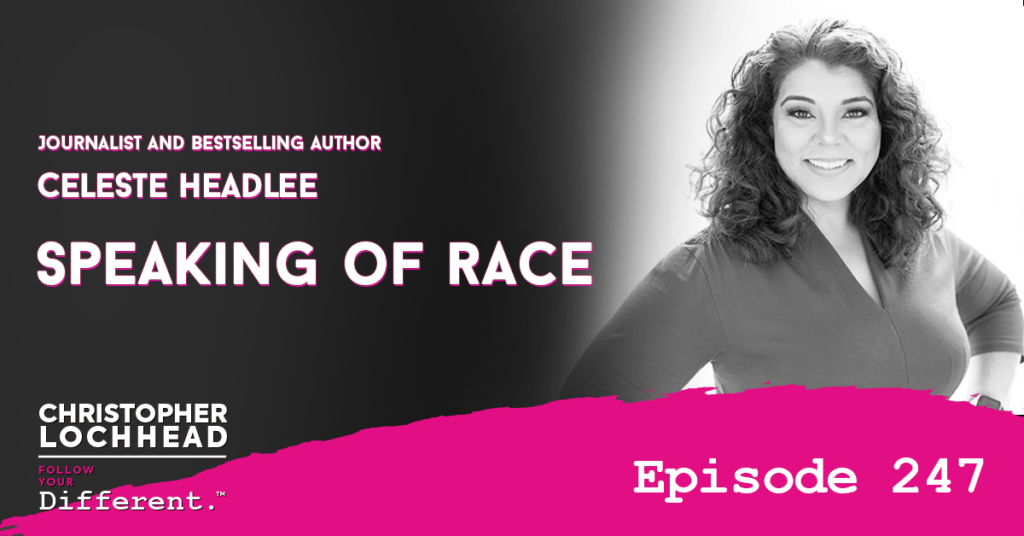
Podcast: Play in new window | Download (Duration: 1:19:26 — 54.5MB) | Embed
Subscribe: Apple Podcasts | Spotify | Pandora | RSS | More
Our ability to communicate and collaborate is core to our humanity. Yet we live in a time where many of us seem to have a very tough time having real, powerful dialogues. In this episode of Follow Your Different, Celeste Headlee shows us how it’s done.
Celeste Headlee is the author of the bestselling book; We Need to Talk: How to have conversations that matter. She has also given out a TED talk, titled 10 Ways to have Better Conversations, which has 25 million views. Her most recent book is called Speaking of Race, which emphasizes the need to talk about racism, and how to do it.
What you’re about to hear is a deep conversation on why authentic conversations matter and how to have them. Also, pay close attention to her ideas on how you can be a more powerful conversationalist, and why our brain rewards us when we have real dialogue.
Celeste Headlee and the Passion for Conversation
The conversation starts off with Celeste sharing where her passion for conversations came from. Celeste shares that there are a few things that bother her as one gets older. Though the one thing that upsets her is when there are things that can be fixed, that are totally fixable, though having proper conversations.
“I mean, there’s just very little that we can’t talk through as human beings. And so I’m passionate about it because it’s universal. Every single person on the planet needs to be able to converse with others and communicate with others well, and be it’s just the root of problem solving. I mean, this is what solves problems, period, whatever they are.” – Celeste Headlee
Why People are not having Meaningful Conversations
Celeste shares her thoughts as to why people seem to have lost the ability to have a meaningful conversation. She has discovered an interesting tidbit while researching for her second book, and it dates all the way back to the Industrial Revolution.
While recent developments and social norms may have exacerbated the situation, the turning point seems to have happened when one guy discovered how to use steam to make our lives better.
“Prior to the Industrial Revolution. Most people lived in rural areas, most people interacted with maybe 100 or 150 people over the course of their lives. Then all of a sudden, the Industrial Revolution came in. Everybody flips over till most people are living in urban areas. Because of that, most people are encountering 1000s of people over the course of a week or a month instead. And it just happened too quickly. We weren’t able to adjust evolve that fast.” – Celeste Headlee
Bringing Back Good and Meaningful Conversations
Celeste thinks that most people don’t know what conversation is anymore. There are some who say that they are good conversationalists. That is, they are good talkers. Those are not the same thing at all.
In order to be a good conversationalist, you have to not only be a good talker. You also have to listen as well as you talk.
“I imagine (Oscar Wilde) was not a good conversationalist. Fantastic talker, but not good in conversation. Why? Because you have to be able to listen as well as you talk. And the smarter you are, the harder that challenge becomes. The wittier you are, the funnier you are, the harder that becomes. But also, listening is just hard. It’s hard for our species.
I think that some of the people that we think of as not being good in conversations are much better than they get credit for. And those are the people who speak less than they listen.” – Celeste Headlee
To hear more from Celeste Headlee on the importance of having a meaningful conversation, download and listen to this episode.
Bio
Celeste Headlee is an award-winning journalist who has appeared on NPR, PBS World, PRI, CNN, BBC and other international networks. She was formerly a host at National Public Radio, anchoring shows including Tell Me More, Talk of the Nation, All Things Considered and Weekend Edition. For many years, Celeste has been a mentor and managing editor for NPR’s Next Generation Radio Project, training young reporters and editors in broadcasting.
Celeste is co-host to the Scene on Radio podcast—MEN with the podcast’s producer, Duke University’s CDS audio director, John Biewen. John describes the season: “Co-host Celeste Headlee and I will take a similar approach to the Seeing White series, which explored the history and meaning of whiteness. With MEN, we’ll be asking questions like, What’s up with this male-dominated world? Is male supremacy inevitable? How did we get sexism/patriarchy/misogyny, and what can we do about it?”
Celeste will co-host new episodes of The Retro Report with Masud Olufani. Retro Report is a non-profit news organization that produces mini documentaries looking at today’s news stories through the lens of history and context.
Until February, 2017 Celeste was the Executive Producer and host of the daily talk show called “On Second Thought” for Georgia Public Broadcasting in Atlanta.
You can listen live to On Second Thought, weekdays from 9 – 10 a.m. EST on the GPB News website. Click here for archives from past shows.
In 2014, Celeste narrated the documentary “Packard: The Last Shift” for the Detroit Free Press. She has won numerous awards for reporting from the Associated Press and SPJ.
Celeste was selected twice to be a Getty/Annenberg Journalism Fellow and was selected as a fellow with the Institute for Journalism and Natural Resources. She was also among the first fellows in Reporting on Native Stories for National Native News.
Until September of 2012, Celeste was the co-host of the national morning news show, The Takeaway, from PRI and WNYC and anchored presidential coverage in 2012 for PBS World Channel.
Links
Follow Celeste Headlee today!
Twitter: @CelesteHeadlee
Check out her new book: Speaking of Race
Watch her Ted Talk: 10 ways to have a better conversation
We hope you enjoyed this episode of Follow Your Different™! Christopher loves hearing from his listeners. Feel free to email him, connect on Facebook, Twitter, Instagram, and subscribe on iTunes!
246 How To Create A New Product, Company, and Category While Having A Baby, All At The Same Time with Malibu Mylk Founder Brittany Fuisz

Podcast: Play in new window | Download (Duration: 1:07:19 — 46.2MB) | Embed
Subscribe: Apple Podcasts | Spotify | Pandora | RSS | More
In this episode of Follow Your Different, we are joined by Brittany Fuisz, the founder of Malibu Mylk. She is an entrepreneur and a friend who I respect and admire deeply.
When Brittany was trying to have a baby for the first time, she was having some difficulty. So she went to work, specifically on improving her diet. She then discovered some huge problems with some of the major categories of alternate milk, like oat and almond milk. So she got busy in her kitchen.
What you’re about to hear is an extraordinarily powerful example of what a mission driven founder is. Someone with a point of view, someone who wants to move the world from the way it is, to a new and different place.
Brittany Fuisz and How Malibu Mylk came to be
Brittany starts off by sharing how she got the idea for Malibu Mylk. She got the idea for it around March of 2018, when she was still working at Yelp. Though she didn’t really go for it full time until she left Yelp later that year.
She had the idea for it when she was trying to have a baby for the first time. After consulting with the doctor, she opted to try a strict diet called the Elimination Diet or Autoimmune Protocol. Basically, she had to eliminate all major allergens in her diet. This means no dairy, nuts, gluten, soy, etc.
So while looking for milk alternatives, she discovered a huge problem: most milk substitutes either have nuts, soy, or gluten. That’s when she had the idea to use something different.
“I was driving past downtown LA and I thought, what if I make milk from flaxseed? Like it was just a sign in the sky. I needed to make flax milk. And so I went home that day, I pulled out my blender. I did go to culinary school many years ago. So I know how to cook.” – Brittany Fuisz
Hitting the Ground Running with Malibu Mylk
After trying out and getting her desired results with the flaxseed milk, Brittany did what any aspiring entrepreneur would do. She reached out to Whole Foods Market with her idea. Brittany pitched the idea for Malibu Mylk, and was surprised when the buyer immediately set up a meeting for it.
While Brittany wanted to delay the meeting to better prepare for it, the buyer said that the meeting was set. So she had to take a crash course on the food and beverage industry and learn the ropes quickly.
“I did a crash course in food and beverage with a friend who’s in the industry the day before the meeting. And I went in with little samples. I had some mock packaging made up. Then I learned about margins, which is how the grocery world works. I went in and I pitched the buyer on the dream that is now Malibu Mylk. She tasted my samples and she said, “Well, I’d love to get this in stores the coming weeks”. I thought well I can’t do the coming weeks, but we can do it in the coming months.
Actually, the timing worked out beautifully because I’d have to go into my first production run, knowing that Whole Foods is going to be a customer.” – Brittany Fuisz
Brittany’s Challenges with Malibu Mylk
Brittany further explains the challenges she had at the beginning of Malibu Mylk. The biggest challenge for her was finding a great manufacturer, a co-packer. There weren’t many that produced her type of product, and the ones she found were awful and expensive. When she finally found one she liked, they said no to her.
So she got an acquaintance who was already manufacturing something in that company, and asked for an introduction. She wasn’t deterred by the first and succeeding No’s that she received, and kept pushing on.
“You’re gonna hear a lot of No’s that you’re gonna hear no, again and again and again. And if you’re not willing to turn it into a yes, some way or another, it won’t work.” – Brittany Fuisz
To hear more from Brittany Fuisz and how she created Malibu Mylk to what it is today, download and listen to this episode.
Bio
Brittany Fuisz is the Founder/CEO of Malibu Mylk, the world’s first organic flax milk. Allergen-free (dairy free, gluten free, nut free, soy free), full of fiber and omega-3s, Malibu Mylk is creamy and thick and is good for our bodies and our planet.
She is a seasoned Marketing Maven and published writer with leadership skills and a track record of driving growth and brand building. A social connector with experience in consumer apps, direct response, media and sales.
Brittany attained her degree in marketing and management from Georgetown University, and then a diploma from Le Cordon Bleu. She began her career with Hillstone Restaurant Group in their manager training program. She spent time working on the line at three Michelin star Le Bernardin in NYC, as well as the Food Network in new business development. Brittany has also appeared on KTLA news, as a guide to the City of Angels.
Links
Website: MalibuMylk.com
Instagram: @MalibuMylk
We hope you enjoyed this episode of Follow Your Different™! Christopher loves hearing from his listeners. Feel free to email him, connect on Facebook, Twitter, Instagram, and subscribe on iTunes!
245 Duped: Double Lives, False Identities, and the Con Man I Almost Married with Bestselling Author Abby Ellin
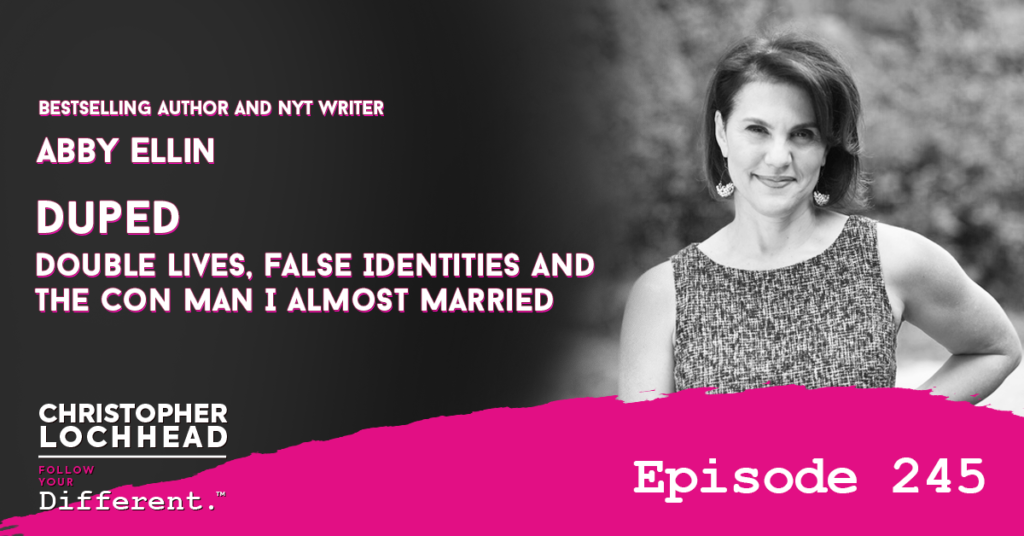
Podcast: Play in new window | Download (Duration: 1:28:41 — 60.9MB) | Embed
Subscribe: Apple Podcasts | Spotify | Pandora | RSS | More
Do you know what it feels like to be duped, or lied to in an extraordinarily manner? Imagine falling in love, and having a whirlwind romance with a doctor, who also serves in the military, claimed to have been stationed at Guantanamo Bay for a time, and claim many other extraordinary things about his life and career. Imagine being proposed to and expecting to marry this amazing man who also worked at the Pentagon. Then imagine it was all a big lie. In this episode of Follow Your Different, Abby Ellin shares her story and more.
Abby Ellin is an extraordinary bestselling author, New York Times writer, and contributor to a ton of other prestigious publications. Her book is called Duped: Double Lives, False Identities, and the Con Man I Almost Married.
In our dialogue, we go deep into her story, and find out why agrees that you can’t see red flags through rose colored glasses.
Abby Ellin on being Duped
The conversation starts off reminiscing about meeting famous people in the past, when we can all actually go outside. The topic then got to Leonard Cohen, and how they were a fan of his work. This segues into the topic at hand, as Leonard Cohen himself was duped by his longtime manager.
Abby Ellin’s book, Duped, seems very personal, and it was radically transparent on what transpired in her life. She didn’t appear to do anything to make herself look good. It was an unembellished account of what she had gone through, and the manipulation that she was subjected to.
“When I write, I can write something but I’m also controlling what you know, and I was totally willing to sound like an asshole and duped because that was part of what needed to be done for that story. I was trying to channel the way other people think about someone who gets deceived, that I was engaged to a pathological liar. He went to jail. And everyone I know who I said that story to have their own story or knew somebody who did. Some of them didn’t want to tell the story publicly or use their names because they felt like such idiots. I was like, “Hey, man. I’m an idiot and I own it. Because it happens and it’s real.” – Abby Ellin
Monetized Suffering
I then comment on Abby’s book, and how it reads and feels like a suspense novel. Abby appreciates the description, and shares that she actually sold the rights to it. So at the very least, someone shares that sentiment as well.
“The operative words here are monetize suffering. So when, when life gives you lemons, you make lemon meringue pie and you eat it and you don’t worry about getting fat. I saw the podcast writes and it’s coming out in September, I think, but it’s going to be like a six part series, and it’s like a suspense thing.” – Abby Ellin
Abby Ellin on Quitting Diet Coke
We then talk about the article that Abby wrote about Diet Coke, and how she quit from it. She has had it since she was around 12 years old, and had been drinking it ever since.
People have told her to quit, but she told them to mind their own business. Yet she knew she was addicted. She was drinking three to four cans a day, and go looking for it when she didn’t have any in reach. But something happened that prompted her to consider quitting.
“My stomach started hurting a lot recently and no one knew why. And I was tasting this diet coke and it started to taste really chemical-y. I asked them if they changed the formula and they said no, but I just was like, I’m done. And I that was it.” – Abby Ellin
To hear more from Abby Ellin and her story on being duped, diet cokes and her thoughts on the Madoff scam, download and listen to this episode.
Bio
Abby Ellin is an award-winning journalist and the author of “Duped: Double Lives, False Identities and the Con Man I Almost Married” and “Teenage Waistland: A Former Fat Kid Weighs
In On Living Large, Losing Weight and How Parents Can (and Can’t) Help.”
For five years she wrote the “Preludes” column about young people and money for the Sunday Money and Business section of the New York Times.
She is also a regular contributor to the Health, Style, Business and Education sections of the New York Times.
Her work has been published in The New York Times Magazine, New York, the Wall Street Journal, the Los Angeles Times Magazine, Psychology Today, Time, Newsweek, the Village Voice, the Boston Phoenix, Salon, Marie Claire, Cosmopolitan, Glamour, and Spy (RIP).
She has been a resident at the Yaddo Corporation and Wildacres Retreat in North Carolina, and has two useless Masters Degrees: an MFA in creative writing from Emerson College and a master’s degree in international public policy from Johns Hopkins University.
As of this writing, her greatest accomplishments are learning to play the cello at age 35, summiting Kilimanjaro (with a broken wrist in a cast!) and naming “Karamel Sutra” ice cream for Ben and Jerry’s.
Links
Follow Abby Ellin today!
Website: AbbyEllin.com
Twitter: @AbbyEllin
Check out the 6-part series, Impostors: The Commander
More on Abby Ellin:
NYTimes: Why do we love scammers so much?
NYTimes: I was powerless over diet coke
Washington Post: A Journalist almost married a con man. It turns out, she wasn’t the only one.
We hope you enjoyed this episode of Follow Your Different™! Christopher loves hearing from his listeners. Feel free to email him, connect on Facebook, Twitter, Instagram, and subscribe on iTunes!
244 Digital and Analog Businesses with Robert Siegel, VC and Author of “The Brains and the Brawn Company”
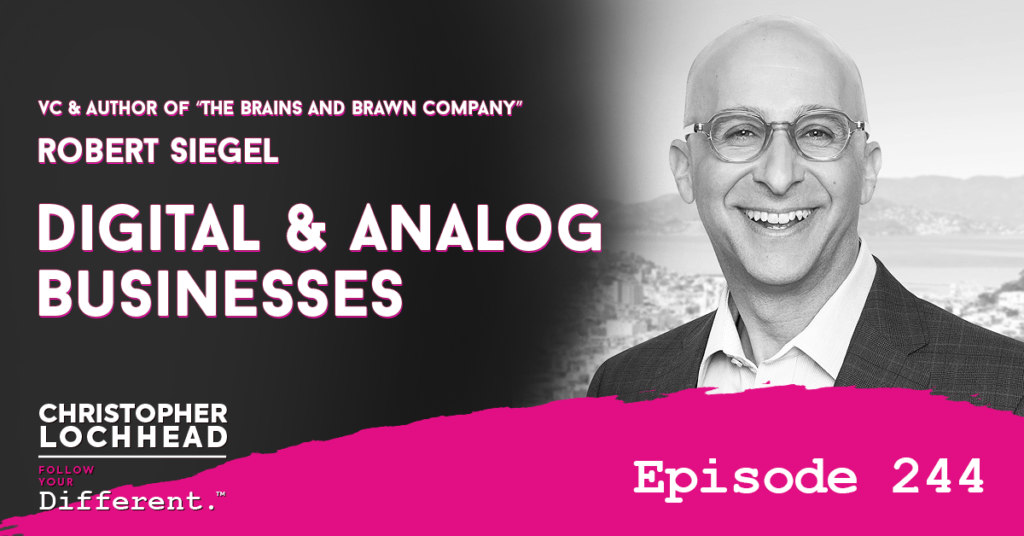
Podcast: Play in new window | Download (Duration: 1:12:09 — 49.5MB) | Embed
Subscribe: Apple Podcasts | Spotify | Pandora | RSS | More
Most businesses are now a hybrid of analog and digital. The question is, how do we get the right mix? Also, how do we know what and when to digitally transform, or keep parts of our business analog? These are just some of the questions that board CEOs and executive teams are grappling with. In this episode of Follow your Different, Robert Siegel will help us get a better grasp at it.
Robert Siegel is a Venture Capitalist and a Stanford lecturer. He has a new book out called The Brains and Brawn Company, and it cracks open many of these kinds of questions. It also provides real research and insight from leading companies in their respective industries, coupled with Robert’s years in Silicon Valley and the entrepreneurial world.
If you’re building companies today, or you want to build a legendary company heading into the future, you’re going to love everything about our dialogue.
Robert Siegel on Digital Transformation
Digital Transformation seems to have become a catch-all phrase that people in the industry use to describe new technology or migrating certain things online.
While it may not seem like much of an issue. It becomes a problem when the supposed “experts” start suggesting that undergoing a Digital Transformation should be done ASAP to improve your company.
“I think that what I’ve learned in my time as a venture capitalist, and also in the teaching that I do at Stanford, is that digital transformation is kind of necessary, but not sufficient. That the world that we’re living in, is increasingly a blend of digital and physical.
And so if you only talk about digital transformation, everything talks about the ones and zeros. Everyone talks about software and connectivity. But people forget, we actually live in a physical world.” – Robert Siegel
The Brain and Brawn Company
We then get into the discussion of Robert’s new book, The Brain and Brawn Company. Robert explains that having both Brain and Brawns is necessary for a company. The Brain being the creative and analytical aspects of business, as well as the digital parts of it. While the Brawn is the physical aspects, like dealing with logistics, manufacturing, and such.
So the optimal setup is having a good mix of “brains” and “brawn” in your company. According to Robert, they don’t deal with those who wish to have a pure digital software platform, because that is not a sustainable model.
“Those companies aren’t going to be successful as we get into a world where things are increasingly blended between digital and physical, and every product and service that we make is connected. And every industry is going to be impacted from not only things like mobility, but healthcare, financial services, there really is education, there isn’t an industry that won’t be impacted by this blend of digital and physical.” – Robert Siegel
Of course, there are business that can go pure digital, but companies in general still need a good blend of digital and analog systems in place to function efficiently.
The Right Mix of Digital and Analog
That said, what is a good mix of digital and analog for a business?
According to Robert, it depends for each business. One of the things to look at is how different systems work in your company. After understanding them, find out if going digital can improve the service, or make it more efficient in the long run.
Of course, there are certain aspects that still need analog aspects, even within digital spaces. Take for instance ordering online. While the whole thing can be made digital nowadays, there are still analog competencies like logistics and customer experience that need to be accounted for. Or the opposite can also be true, like adding digital improvements to delivery tracking, so that customers know the real-time location of their on-going delivery.
So in the end, it’s best to find the right mix for your own company.
To hear more from Robert Siegel and how to find the right mix of digital and analog in your business, download and listen to this episode.
Bio
Robert Siegel is a lecturer in management and has led primary research and written cases on Google, Charles Schwab, Daimler, AB InBev, Box, Stripe, Target, AngelListopen, 23andMe, C3.ai, Majid Al Futtaim, Tableau, PayPal, SurveyMonkey, Medium, Autodesk, Minted, Zuora, Axel Springer, and Michelin, amongst others.
Robert is a member of the supervisory board of TTTech Auto AGopen, and is chairman of the strategic advisory board for TTTech Computertechnik AGopen in Vienna, Austria. He is a member of the industry advisory boards for HERE Technologiesopen and Tulcoopen, and is the copresident emeritus of Stanford Angels & Entrepreneursopen, an alumni association that fosters relationships to strengthen the Stanford startup community. Robert was on the board of SmartDrive Systemsopen for 14 years (acquired by Omnitracs), has coauthored several articles for the Harvard Business Reviewopen and California Management Reviewopen, and is a frequent contributor to Fortune, TechCrunch, VentureBeat and Forbes.
Robert was previously general manager of the video and software solutions division for GE Security, with annual revenues of $350 million. He was also executive vice president of Pixim, Inc., a fabless semiconductor firm specializing in image sensors and processors (acquired by Sony). Before Pixim, Robert was cofounder & chief executive officer of Weave Innovations Inc. (acquired by Kodak), a network services developer that invented the world’s first digital picture frame, and delivered photos and other digital media to PCs and internet / mobile devices.
Robert served in various management roles at Intel Corporation, including an executive position on their corporate business development team, in which he invested capital in startups that were strategically aligned with Intel’s vision.
Robert is the coinventor of four patents and served as lead researcher for Andy Grove’s best-selling book, Only the Paranoid Survive.
Robert holds a BA from UC Berkeley and an MBA from Stanford Graduate School of Business. He is married with three children.
Links
Follow Robert Siegel today!
Website: RobertESiegel.com
LinkedIn: in/RSiegel
Twitter: @RobSiegel
Read his new book: The Brains and Brawn Company
We hope you enjoyed this episode of Follow Your Different™! Christopher loves hearing from his listeners. Feel free to email him, connect on Facebook, Twitter, Instagram, and subscribe on iTunes!

